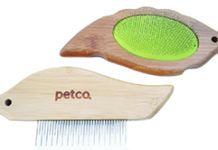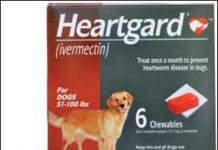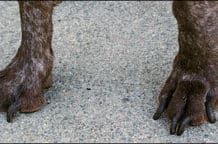Home Search
index.html - search results
If you're not happy with the results, please do another search
Wolves, Dogs, Differ in Ability to Digest Starches
Study finds genetic differences between dogs and wolves, with dietary implications. Domestication appears to have led to genetic changes in dogs that make them able to digest starches better than wolves can, according to a paper published in Nature in January.
Dog Gear of the Year 2012
Few of WDJ’s contributors are shoppers; most of us have too many dogs to support for us to be in the habit of foraging through irresistibly cute items in boutique pet supply stores! But when pressed to think about it, all of us have one or two items in our dog-care arsenal that we couldn’t possibly live without – products that are so useful or so good at fulfilling every aspect of their design, that we use them with our dogs practically every day. Here are some of the products that made their “must-have” lists.
Sardines: Not Hot.
Nights with typical winter temperatures are finally arriving here in Northern California. (Sorry! I know that many of you have been experiencing freezing temps at night for weeks – months? – already.) And with the cold comes Tito’s reluctance to go outside and potty on any schedule other than his own.
The Dog Ate My (fill in the blank)
It’s one of the oldest excuses known to man, perhaps even pre-dating man’s willingness to share a home with dogs. But every once in a while it’s true: The dog DID eat something critical. Seattle resident Russ Berkman came home from work one day and found some tiny scraps of paper and elastic on the floor. A minute’s worth of detective work confirmed that the scraps were all that was left of four tickets to the 2012 Masters (golf) Tournament in Augusta, Georgia – and that the culprit was his Swiss Mountain Dog, Sierra.
Merial Runs Out of Immiticide for Heartworm Treatment
The supply of Immiticide (melarsomine dihydrochloride), the only drug approved to treat heartworm infections in dogs, has been low since December 2009, but now it’s completely gone. Merial confirmed that it was officially out of the drug on August 9, 2011. The current situation is due to a new and separate manufacturing challenge related to technical issues with the company who provides the finished product, according to a Merial spokesperson. Merial said the company is working hard to make the drug available again, but cannot speculate when that might happen.
Heartworm Resistance Update September 2011
In “Time to Step It Up” (WDJ July 2011), we described one small study that showed only Advantage Multi was 100 percent effective against the MP3 strain of resistant heartworms after a single dose. The report was true as far as it went, but new points have emerged that make this a more complex story and one for which we do not have all the answers yet.
Concerns About Dog Parks
Trish King, Director of Training and Behavior, Marin Humane Society, Novato, California, (marinhumanesociety.org) says potential dog park problems include...
Toxic Blue-Green Algae Can Be Deadly to Your Dog
It’s that time of year again – when news reports start coming out of dogs dying after swimming in or drinking from ponds, lakes, and reservoirs polluted with toxic blue-green algae. The component of the algae that produces toxins is called cyanobacteria. Three dog deaths in July have been attributed to toxic algae at Grand Lake St. Marys in Ohio, but the problem can occur anywhere.
Credible Canine Health Information on the Internet
When you or a loved one develops a medical issue, chances are you’ll be inclined to do some Internet research. While I say, “More power to you!” other medical professionals might roll their eyes at the thought of “wasting” valuable time discussing potentially whackadoodle notions gleaned from cyberspace. Whether veterinarians like it or not, the Internet is here to stay. What can you do to make your online research more productive and your discussions about it with your vet more palatable? Here’s how to find instructive, accurate, credible Internet information while avoiding “online junk food” -and how to comfortably discuss what you’ve learned online with your veterinarian in a way that promotes collaborative discussion. By the way, although I’m a veterinarian teaching people how to better care for their dogs, this information is also applicable to your own healthcare! So, let’s begin. How can you determine whether or not a website is dishing out information that is worthy of your time?
Train Your Dog to Behave During Grooming
Two months ago, I read a news story about a dog owner in Minnesota who had shared her home and her life with her 10-year-old Great Pyrenees for eight years. On December 30, 2008, the dog attacked his owner as she was trying to trim his nails, sending her to the hospital for multiple bite wounds to her arms. The news report on the incident stated, “[The dog owner] was able to reach another room and closed the door, keeping the dog out.” The owner in this sad story was treated and released from the hospital the same day. The dog is now dead – euthanized at the veterinary hospital for safety reasons, at the owner’s request.Nail-trimming should not be a matter of life and death. Nor should any other routine grooming procedure. If a dog objects strongly to any sort of physical contact or restraint that may occur in the process of ordinary care, a smart, responsible owner needs to take immediate steps to overcome his objections in a positive, nonaversive manner. Fortunately, this process (described in detail below) is not difficult (or dangerous!) to do – but it does take a serious commitment of time.
Shots Fired: Professional veterinary associations call for a reduced canine vaccination protocol
In the past decade, the veterinary profession’s overall attitude toward vaccination has evolved to a point that can be tentatively termed progressive. In 2002, the American Veterinary Medical Association issued a policy statement that urged veterinarians to “customize” vaccine protocols for individual patients, since there is “inadequate data to scientifically determine a single best protocol” for initial or repeat vaccinations. A year later, the prestigious American Animal Hospital Association (AAHA) released its landmark canine vaccination guidelines, which were updated in 2006.
New Information about Wolbachia may Change Heartworm Treatment
For some time, biologists have been aware of and studied an organism called Wolbachia that lives symbiotically inside heartworms. But recently, study of this microscopic creature has given researchers new ideas about how to combat its host (the heartworm) to benefit its host, the dog. Wolbachia is a genus of rickettsial organisms, a microorganism positioned somewhere between viruses and true bacteria. Like viruses, they grow only in living cells, but like bacteria, they…








